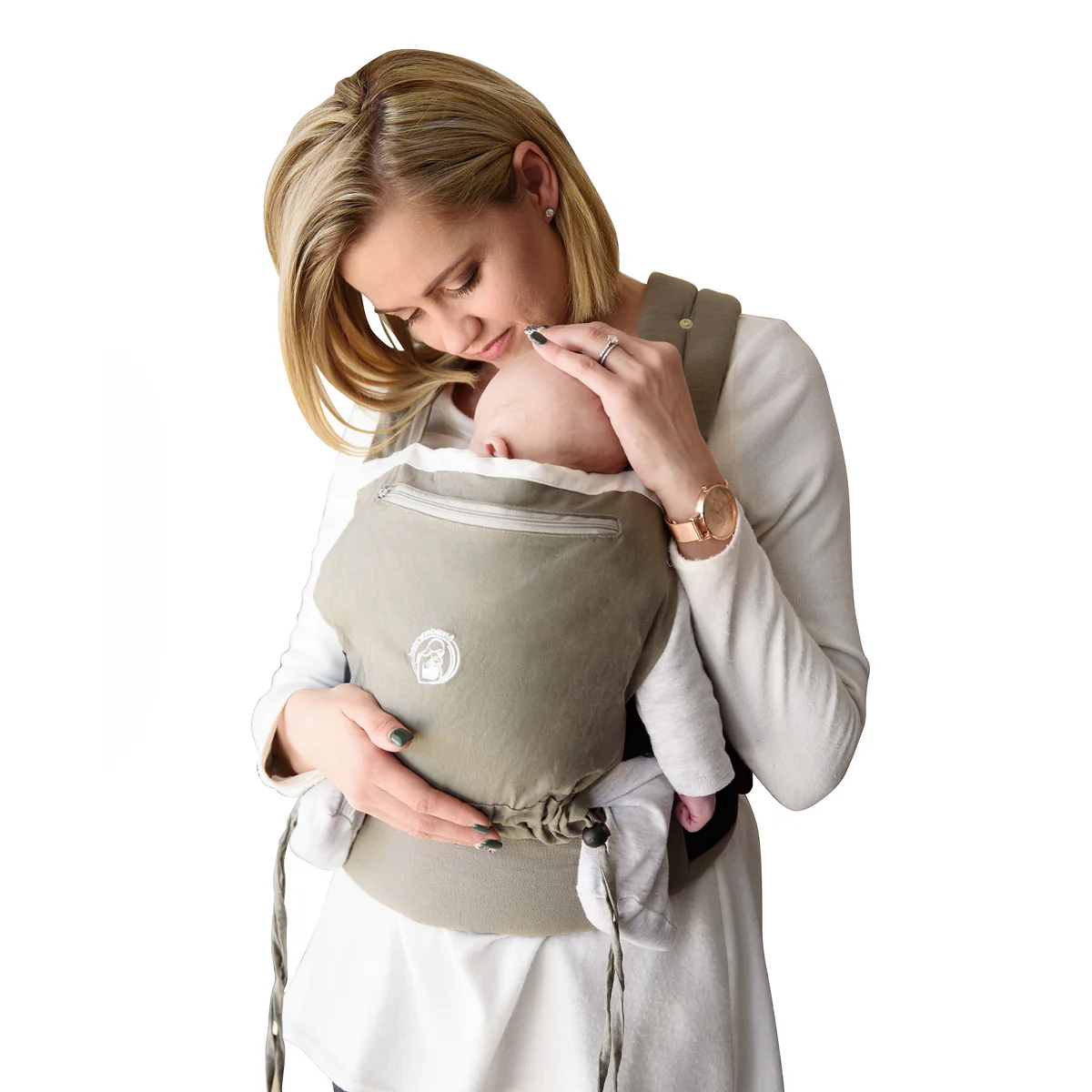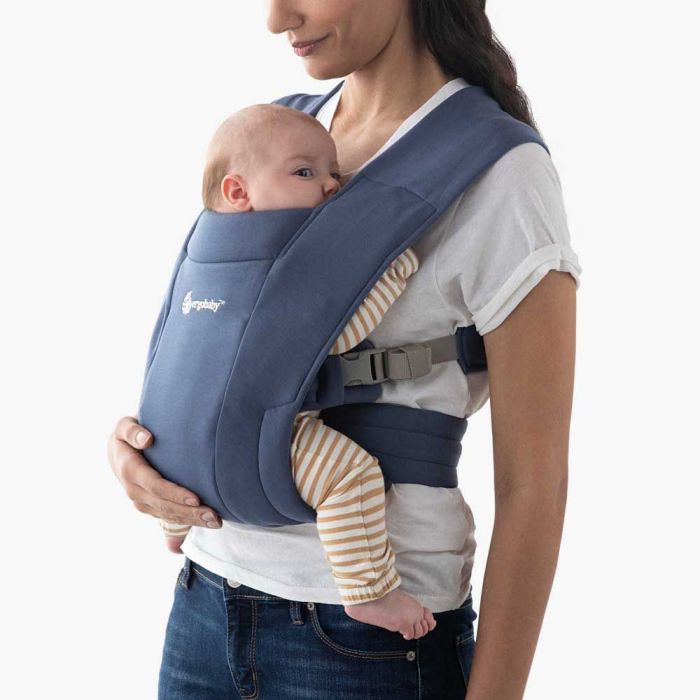Benefits of Using a Soft Baby Carrier
The benefits of using a soft baby carrier are vast and can significantly improve the bonding experience between parents and their infants. Here are some key advantages that highlight the importance of choosing a soft baby carrier for your little one.
- Close Contact: A soft baby carrier enables constant contact. This helps in building a stronger bond as babies feel more secure when held close.
- Hands-Free Convenience: With a soft baby carrier, your hands remain free. This allows you to carry out tasks while ensuring your baby is safe and content.
- Comfort for Baby: Soft carriers are designed to support babies in a natural and comfortable position. It mimics the feeling of being cradled in arms.
- Even Weight Distribution: Many soft baby carriers are designed to distribute the baby’s weight evenly. This is crucial to alleviate strain on your back and shoulders.
- Ease of Breastfeeding: For nursing mothers, a soft baby carrier can offer discretion and convenience. It simplifies the breastfeeding process when on the go.
- Portable and Lightweight: Soft baby carriers are typically easy to carry around. They fold up compactly, making them perfect for travel.
- Promotes Development: The upright position in a carrier can help with baby’s digestion and reduce issues like acid reflux. The constant movement and varied scenery can also be stimulating for your baby’s development.
Every parent desires a perfect balance of snugness and freedom when it comes to holding their baby. Soft baby carriers can provide just that while keeping your baby close and your hands free for day-to-day activities. Ensure that you consider these benefits when you’re in the market for a soft baby carrier, so you and your baby can enjoy the comfort and convenience it brings.
Types of Soft Baby Carriers
Choosing the right soft baby carrier is crucial for convenience and comfort. There are several types of carriers, each with unique features catering to the needs of parents and their babies.
Structured Carriers
Structured carriers, often known as ‘buckle carriers,’ offer sturdy support with padded straps and waistbands. They are user-friendly, with adjustable buckles for the perfect fit. These carriers typically have a built-in seat for the baby, ensuring a secure and ergonomic position.
Wrap Carriers
Wrap carriers are made of a long piece of fabric that you wrap around your body and tie securely. This type of soft baby carrier offers a custom fit every time and is excellent for newborns due to its snugness and support. Wraps can be more challenging to master but provide a closer bond once properly tied.
Sling Carriers
Sling carriers consist of a wide piece of fabric looped over one shoulder and across the torso. They create a pouch to hold the baby close. Slings are simple to use and allow for easy breastfeeding. They are also compact and excellent for quick trips. However, they might put more strain on one shoulder, so it’s important to switch sides often.
Key Features to Look for in a Soft Baby Carrier
When selecting a soft baby carrier, certain key features stand out as essential. Here’s what to consider to ensure you get the best carrier for your needs:
- Ergonomic Design: Look for a carrier that supports your baby’s hips, back, and legs in an “M” shape position. This design is crucial for healthy hip development.
- Adjustability: A good carrier should adjust to different body sizes. It ensures a comfortable fit for both the baby and the wearer.
- Breathable Fabric: Choose a carrier made from breathable materials. This helps to regulate your baby’s temperature and keeps both of you comfortable.
- Durability: The carrier should be sturdy and able to withstand regular use over time.
- Ease of Cleaning: Check if the carrier is machine washable. Easy cleaning is a must for dealing with spills and messes.
- Storage Options: Extra pockets or storage areas come in handy for carrying essentials like diapers and wipes.
- Comfort Padding: Look for padded shoulder straps and waistbands. These reduce the strain on your shoulders and hips during extended wear.
- Safety Standards: Ensure the carrier meets safety standards. Strong buckles and reinforced stitching are indicators of a secure carrier.
By considering these features, you can find a soft baby carrier that brings comfort and convenience to your parenting journey. Remember to balance your personal needs with these key attributes to get the best fit for you and your little one.
Safety Tips for Babywearing with Soft Carriers
Ensuring safety while using a soft baby carrier is paramount. Here are several critical tips to help you wear your baby securely and reduce risks:
- Check the Carrier Before Each Use: Look for any signs of wear and tear. Make sure there are no ripped seams or damaged buckles that could compromise safety.
- Read the Manual: Each carrier comes with specific instructions. It is essential to read and follow these guidelines for correct usage.
- Ensure Proper Fit: Adjust the carrier to fit your baby snugly. There should be no loose fabric or straps. A proper fit prevents your baby from slipping out.
- Keep Baby’s Airway Clear: Always ensure that your baby’s face is visible and their nose and mouth are unobstructed to avoid suffocation risks.
- Support the Baby’s Neck: Infants need neck support since they cannot hold up their heads. Be sure the carrier provides adequate neck support.
- Be Mindful of Your Activity: Avoid any activities that could risk your baby’s safety. This includes cooking near a hot stove or drinking hot beverages.
- Listen to Your Baby: Pay attention to your baby’s cues. If they seem uncomfortable or in distress, adjust the carrier or take a break.
- Practice: If you’re new to babywearing, practice with a doll first. Get comfortable with the process before wearing your baby.
- Check Baby’s Position Regularly: Regularly make sure that your baby is in a safe, ergonomic position, with knees higher than the buttocks.
- Use a Mirror: A mirror can help you see if the baby is positioned correctly without twisting or straining.
Following these safety tips can help ensure that your experience with a soft baby carrier is both secure and enjoyable for you and your baby. Remember, never compromise on safety; if in doubt, consult with a pediatrician or babywearing expert.
How to Choose the Right Soft Baby Carrier for You and Your Baby
Choosing the right soft baby carrier can feel overwhelming given the array of options available. However, by focusing on a few key aspects, you can make an informed decision that suits both you and your baby’s needs. Here are some steps and considerations to help you select the perfect soft baby carrier:
- Assess Your Baby’s Age and Weight: Different carriers are suited for various stages of a baby’s growth. Ensure that the carrier you choose is appropriate for your baby’s current size and has the capacity to support their weight as they grow.
- Consider Your Lifestyle: Your daily activities should influence your choice. If you travel often, a lightweight, portable carrier might be ideal. For long walks or chores, a carrier with robust back support might be better.
- Think About Climate: The material of the carrier should be suitable for the weather in your area. In hot climates, a carrier with breathable fabric can prevent overheating.
- Determine Comfort Levels: For extended periods of use, find a carrier that is comfortable for both you and your baby. Check for padding and ergonomic design to avoid discomfort.
- Seek Adjustability: A carrier that adjusts easily will accommodate your growing baby and can be tailored to fit different caregivers.
- Try Before You Buy: Whenever possible, test out carriers before making a purchase. This allows you to check the fit, ease of use, and overall comfort firsthand.
- Read Reviews and Get Recommendations: Learn from the experiences of others. Reading reviews and talking to fellow parents can provide valuable insight.
- Safety First: Always verify that the carrier meets safety standards and check for the Juvenile Products Manufacturers Association (JPMA) certification.
By taking these factors into account, you’ll be well on your way to finding a soft baby carrier that makes life with your little one easier and more delightful.
Comfort Tips for Parents When Using a Soft Baby Carrier
Using a soft baby carrier can make life much easier for parents. To maximize comfort throughout the day, here are some useful tips:
- Wear Comfortable Clothes: Opt for clothing that is breathable and doesn’t bunch up under the carrier straps. This helps prevent chafing and discomfort.
- Adjust the Straps Properly: Before placing your baby in the carrier, adjust the straps to suit your body. Doing this means less fuss once your baby is in.
- Use the Carrier’s Features: Utilize all the padding and support your carrier offers. Make sure to take advantage of waistbands and shoulder pads for extra comfort.
- Switch Positions: Periodically changing the carrier’s position can relieve pressure points. It also helps distribute your baby’s weight evenly.
- Take Breaks: Don’t overdo it. If you or your baby feel uncomfortable, take a break. This rest period can be beneficial for both of you.
- Strengthen Your Core: Having a strong core can make carrying your baby easier on your body. Consider simple, baby-friendly exercises to build strength.
- Listen to Your Body: Pay attention to signals from your body. If you experience pain or fatigue, adjust the carrier or take your baby out for a while.
By following these simple tips, you and your baby can enjoy the convenience of a soft baby carrier without sacrificing comfort.



